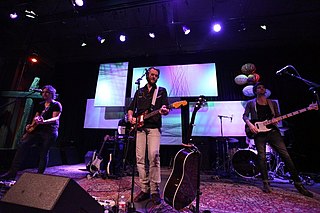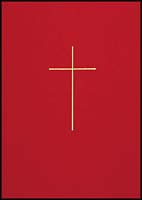Related Research Articles
The Apostles' Creed, sometimes titled the Apostolic Creed or the Symbol of the Apostles, is a Christian creed or "symbol of faith".

"God Save the Tsar!" was the national anthem of the Russian Empire. The song was chosen from a competition held in 1833 and was first performed on 18 December 1833. It was composed by violinist Alexei Lvov, with lyrics written by the court poet Vasily Zhukovsky. It was the anthem until the February Revolution of 1917, after which "Worker's Marseillaise" was adopted as the new national anthem until the overthrow of the Russian Provisional Government by the Bolsheviks in the October Revolution of the same year.
The Evangelical Lutheran Church in America (ELCA) is a mainline Protestant Lutheran church headquartered in Chicago, Illinois. The ELCA was officially formed on January 1, 1988, by the merging of three Lutheran church bodies. As of 2021, it has approximately 3.04 million baptized members in 8,724 congregations.

Contemporary worship music (CWM), also known as praise and worship music, is a defined genre of Christian music used in contemporary worship. It has developed over the past 60 years and is stylistically similar to pop music. The songs are frequently referred to as "praise songs" or "worship songs" and are typically led by a "worship band" or "praise team", with either a guitarist or pianist leading. It has become a common genre of music sung in many churches, particularly in charismatic or non-denominational Protestant churches with some Roman Catholic congregations incorporating it into their mass as well.

"Love Divine, All Loves Excelling" is a Christian hymn by Charles Wesley on Christian perfection. Judging by general repute, it is among Wesley's finest: "justly famous and beloved, better known than almost any other hymn of Charles Wesley." Judging by its distribution, it is also among his most successful: by the end of the 19th century, it is found in 15 of the 17 hymn books consulted by the authors of Lyric Studies. On a larger scale, it is found almost universally in general collections of the past century, including not only Methodist and Anglican hymn books and commercial and ecumenical collections, but also hymnals published by Reformed, Presbyterian, Baptist, Brethren, Seventh-day Adventist, Lutheran, Congregationalist, Pentecostal, and Roman Catholic traditions, among others including the Churches of Christ. Specifically, it appears in 1,328 of the North American hymnals indexed by the online Dictionary of North American Hymnology, comparable to Newton's "Amazing Grace" (1,036), Wesley's "O for a Thousand Tongues" (1,249), and Watts' "When I Survey the Wondrous Cross" (1,483), though still well short of Toplady's "Rock of Ages" (2,139) or Wesley's own "Jesu, Lover of my Soul" (2,164).

Eucharistic adoration is a Eucharistic devotional practice primarily in Western Catholicism, but also to a lesser extent in certain Lutheran and Anglican traditions, in which the Blessed Sacrament is adored by the faithful. This practice may occur either when the Eucharist is exposed, or when it is not publicly viewable because it is reserved in a place such as a church tabernacle.
Christian liturgy is a pattern for worship used by a Christian congregation or denomination on a regular basis. The term liturgy comes from Greek and means "public work". Within Christianity, liturgies descending from the same region, denomination, or culture are described as ritual families.

In Christianity, worship is the act of attributing reverent honour and homage to God. In the New Testament, various words are used to refer to the term worship. One is proskuneo which means to bow down to God or kings.
The Lutheran Book of Worship (LBW) is a worship book and hymnal published in 1978 and was authorized for use by several Lutheran denominations in North America, including predecessors of the Evangelical Lutheran Church in America and Evangelical Lutheran Church in Canada. The Lutheran Church—Missouri Synod was initially involved in the hymnal's development but officially withdrew.
Marty Haugen is an American composer of liturgical music.
The Divine Service is a title given to the Eucharistic liturgy as used in the various Lutheran churches. It has its roots in the Pre-Tridentine Mass as revised by Martin Luther in his Formula missae of 1523 and his Deutsche Messe of 1526. It was further developed through the Kirchenordnungen of the sixteenth and seventeenth centuries that followed in Luther's tradition.

The Lutheran Hymnal (TLH) is one of the official hymnals of the Lutheran Church–Missouri Synod (LCMS). Published in 1941 by Concordia Publishing House in St. Louis, Missouri, it was the denomination's second official English-language hymnal, succeeding the 1912 Evangelical Lutheran Hymn-Book. A 1969 Worship Supplement contains additional hymns and service music.

Evangelical Lutheran Worship (ELW) is the current primary liturgical and worship guidebook and hymnal for use in the Evangelical Lutheran Church in America and the Evangelical Lutheran Church in Canada, replacing its predecessor, the Lutheran Book of Worship (LBW) of 1978, and its supplements, Hymnal Supplement 1991 and With One Voice (WOV).

The Service Book and Hymnal (SBH) was used by most of the Lutheran church bodies in the United States that today compose the Evangelical Lutheran Church in America (ELCA) prior to the publishing of the Lutheran Book of Worship (LBW) of 1978. In ELCA circles, historically, the Service Book and Hymnal has been called the "red book" while the Lutheran Book of Worship has been called the "green book." The newest ELCA hymnal, Evangelical Lutheran Worship (ELW) is also red in color, and has apparently been dubbed "the cranberry book".

"The Lord's My Shepherd" is a Christian hymn. It is a metrical psalm commonly attributed to the English Puritan Francis Rous and based on the text of Psalm 23 in the Bible. The hymn first appeared in the Scots Metrical Psalter in 1650 traced to a parish in Aberdeenshire.
The Eucharist in the Lutheran Church refers to the liturgical commemoration of the Last Supper. Lutherans believe in the real presence of Christ in the Eucharist, affirming the doctrine of sacramental union, "in which the body and blood of Christ are truly and substantially present, offered, and received with the bread and wine."

Lutheran Worship (LW) is one of the official hymnals of The Lutheran Church–Missouri Synod (LCMS). Published in 1982 by Concordia Publishing House in St. Louis, Missouri, it is the denomination's third English-language hymnal and was intended to replace The Lutheran Hymnal (TLH). Additional hymns and service music are contained in the companion, Hymnal Supplement 98.

Ludmilla Elisabeth of Schwarzburg-Rudolstadt was a German noblewoman and a hymn poet. She was a Countess of Schwarzburg-Rudolstadt by birth.
Ruth Carolyn Duck is an ordained pastor in the United Church of Christ, a liturgical theologian and retired professor of worship who taught for 27 years at Garrett-Evangelical Theological Seminary in Evanston, Illinois. Duck is best known for her work as a composer, writer and adaptor of hymns. In 1973, she was part of the committee at the Ecumenical Women's Center of Chicago that produced Because We Are One People, the first 20th century collection of original and adapted hymns that promoted the use of “non-sexist language”. Since that time, Duck has written over 150 hymns, edited three books of sources for worship services and written on the topic of Trinitarian theology, all with an eye toward facilitating the use of gender inclusive language in the context of Christian worship. She is a leading, contemporary champion for and developer of inclusive language worship sources.
References
- 1 2 "'I Am the Bread of Life' composer tells her story in new book". The Catholic Voice. October 22, 2007. Retrieved April 22, 2019.
- 1 2 Toolan, Suzanne (September 2, 2016). "The Story of "I Am the Bread of Life"". Sisters of Mercy . Retrieved April 22, 2019.
- ↑ "Bread of Life (Toolan)". hymnary.org . Retrieved April 22, 2019.